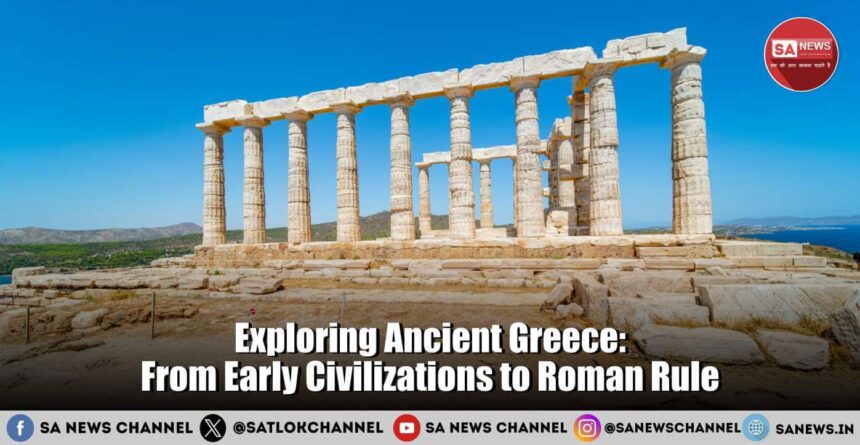Discover the rich tapestry of Ancient Greece, a civilization that profoundly shaped the Western world. From the early Minoan and Mycenaean societies to the rise of city-states and the brilliance of the Classical Period, explore how Greece’s cultural achievements, democratic innovations, and epic conflicts laid the groundwork for modern civilization. Delve into the era of Alexander the Great and the Hellenistic Period, and see how Greece’s legacy continued through Roman times. Join us on a journey through time to understand the enduring influence of Ancient Greece.”
- Where is Greece?
- Global Recognition of Greece
- The Dark Ages (1100-750 BCE)
- The Archaic Period (750-500 BCE)
- The Classical Period (500-323 BCE)
- The Rise of Macedon and Alexander the Great (4th Century BCE)
- The Hellenistic Period (323-31 BCE)
- The Roman Conquest
- Rise from isolated communities to a civilization
- The Spiritual Path to Salvation: Teachings of Chyren Sant Rampal Ji Maharaj
- FAQs About history of Ancient Greece
- 1. What are the main periods of Ancient Greek history?
- 2. What was the significance of the Classical Period in Greece?
- 3. Who was Alexander the Great and why was he important?
- 4. What is the significance of Greek philosophy?
- 5. How did Ancient Greece influence modern society?
- Connect With Us on the Following Social Media Platforms
Where is Greece?
Greece is located in southeastern Europe, at the southern tip of the Balkan Peninsula. It is bordered by Albania to the northwest, North Macedonia and Bulgaria to the north, and Turkey to the northeast. Greece has coastlines along the Aegean Sea to the east, the Ionian Sea to the west, and the Mediterranean Sea to the south. Its capital city is Athens.
Global Recognition of Greece
The world knows about Greece primarily through its profound contributions to Western civilization, particularly in philosophy, politics, art, and science. Ancient Greece is celebrated for the development of democracy, especially in Athens, as well as for its influential philosophers like Socrates, Plato, and Aristotle. Greek literature, such as Homer’s ‘Iliad’ and ‘Odyssey’, and its dramas by playwrights like Sophocles and Euripides, have shaped storytelling traditions.
Greek architecture, particularly structures like the Parthenon, and the Olympic Games, which originated in ancient Greece, are also well-known globally. Additionally, the conquests of Alexander the Great spread Greek culture across Europe, Asia, and Africa, further embedding it into the foundations of many civilizations.
Tourism of Greece, with its ancient ruins, beautiful landscapes, and historical significance, also helps keep its legacy alive and known worldwide.
The Dark Ages (1100-750 BCE)
Following the fall of the Mycenaean civilization, Greece entered a period known as the Dark Ages. This era was characterized by a decline in population, the loss of writing, and a retreat into small, isolated communities. Despite this, oral traditions such as Homer’s Iliad and Odyssey kept the memory of earlier times alive. By around 800 BCE, Greek society began to recover, laying the groundwork for the next period of Greek history.
The Archaic Period (750-500 BCE)
The Archaic Period marked the revival of Greek civilization. During this time, Greek city-states, or poleis, began to emerge, with Athens, Sparta, Corinth, and Thebes among the most prominent. The political landscape shifted as Greek society became more organized and complex, with the concept of citizenship emerging.
During this period, Greece expanded its influence across the Mediterranean through colonization. Greek settlers established colonies from the coast of modern-day Turkey (Ionia) to southern Italy and Sicily, spreading Greek culture and trade across the region.
■ Also Read: Roman Empire History Revealed: From Mythical Beginnings to Lasting Impact
The development of democracy began in Athens during this time, particularly under the leadership of Solon (c. 594 BCE) and Cleisthenes (c. 508 BCE), who introduced reforms that gave more power to the common citizen. In contrast, Sparta developed into a militaristic society with a rigid social hierarchy, known for its formidable army.
The Classical Period (500-323 BCE)
The Classical Period is often seen as the pinnacle of Greek cultural and intellectual achievement. It began with the Greco-Persian Wars (499-449 BCE), during which the Greek city-states united to repel the vast Persian Empire under kings Darius and Xerxes. Key battles such as Marathon, Thermopylae, and Salamis showcased the resolve and ingenuity of the Greeks.
Following the wars, Athens became the dominant power in Greece, under the leadership of Pericles. The Golden Age of Athens saw the construction of the Parthenon, the flourishing of Greek drama (with playwrights like Sophocles, Euripides, and Aeschylus), and the development of philosophy by figures such as Socrates and Plato. Athens became a center of learning, art, and politics.
However, internal conflict among the Greek city-states led to the Peloponnesian War (431-404 BCE), a prolonged and devastating conflict between Athens and Sparta. Sparta emerged victorious, but the war weakened all of Greece, leaving it vulnerable to external threats.
The Rise of Macedon and Alexander the Great (4th Century BCE)
In the 4th century BCE, the kingdom of Macedon, under Philip II, began to rise in power. Philip unified much of Greece through diplomacy and warfare, setting the stage for his son, Alexander the Great, to expand the Greek world even further.
Alexander, one of history’s greatest military leaders, launched an ambitious campaign against the Persian Empire in 334 BCE. Over the next decade, he conquered a vast territory stretching from Greece to Egypt and as far east as India, creating the largest empire the world had seen to that point. Alexander’s conquests spread Greek culture throughout the known world, initiating the Hellenistic Period.
The Hellenistic Period (323-31 BCE)
After Alexander’s death in 323 BCE, his empire fragmented into several Hellenistic kingdoms, including the Ptolemaic Kingdom in Egypt and the Seleucid Empire in Persia. These kingdoms became centers of Greek culture and learning, and Greek influence spread as far as India. This period saw the rise of Alexandria as a major hub of intellectual activity, with scholars like Euclid and Archimedes making significant contributions to mathematics and science.
The Hellenistic Period also witnessed the blending of Greek and Eastern cultures, as Greek art, philosophy, and governance interacted with the traditions of the conquered lands. The spread of Hellenism created a cosmopolitan world where Greek ideas coexisted with local traditions.
The Roman Conquest
By the 2nd century BCE, the Roman Republic had grown in strength and began to dominate the Mediterranean world. After a series of wars, including the decisive defeat of the Macedonian kingdom in 168 BCE, Greece gradually came under Roman control. In 146 BCE, the Romans fully annexed Greece, making it part of their expanding empire. Although Greece was now under Roman rule, Greek culture and its learning continued to influence Roman society deeply.
Rise from isolated communities to a civilization
The history of Ancient Greece is marked by its development from small, isolated communities to a civilization that left an indelible mark on the world. Its achievements in art, literature, philosophy, politics, and science continue to influence contemporary society. The legacy of Ancient Greece can be seen not only in Western civilization but in the universal human quest for knowledge, democracy, and beauty.
The Spiritual Path to Salvation: Teachings of Chyren Sant Rampal Ji Maharaj
Sant Rampal Ji Maharaj teaches that no matter how much worldly success or material wealth one acquires, without the wealth of spirituality, a human life is ultimately wasted. He emphasizes that even if a person is born as a king, ruling over vast kingdoms and possessing immense riches, it holds no true value if he does not engage in spiritual practice and devotion to the Supreme God.
According to Sant Rampal Ji, human birth is a rare and precious opportunity given by God to attain salvation. Unlike other life forms, only humans have the capacity to understand and follow the true path to liberation as prescribed in the scriptures. Material wealth, power, and status are temporary and fleeting. They can neither bring lasting peace nor help in escaping the cycle of birth and death. What truly matters is gaining spiritual wealth by recognizing and worshiping the Supreme God, Kabir Saheb ji, as described in holy texts like the Gita, Vedas, Bible, and Quran.
He further teaches that the purpose of human life is to seek and attain liberation by following the right path of devotion, based on the guidance of a true spiritual master. Without this understanding and practice, human life is spent in the pursuit of temporary pleasures, leading to unending cycles of rebirth. Therefore, Sant Rampal Ji urges everyone to realize the importance of spiritual wealth, engage in true worship, and strive for salvation, which is the ultimate goal of life.
Follow Spiritual Leader Saint Rampal Ji Maharaj on YouTube channel.
FAQs About history of Ancient Greece
1. What are the main periods of Ancient Greek history?
Ancient Greek history is divided into several key periods: the Minoan and Mycenaean Civilizations (3000-1100 BCE), the Dark Ages (1100-750 BCE), the Archaic Period (750-500 BCE), the Classical Period (500-323 BCE), the Hellenistic Period (323-31 BCE), and finally, the period of Roman conquest.
2. What was the significance of the Classical Period in Greece?
The Classical Period (500-323 BCE) is often regarded as the height of Greek cultural achievement. It saw the development of democracy in Athens, remarkable contributions in drama, philosophy, and art, and key victories in the Greco-Persian Wars. It also includes the Golden Age of Athens under Pericles and the eventual Peloponnesian War.
3. Who was Alexander the Great and why was he important?
Alexander the Great was the king of Macedon who created one of the largest empires in history by conquering lands from Greece to Egypt and as far as India. His conquests spread Greek culture across the known world, leading to the Hellenistic Period, which blended Greek, Persian, and other Eastern traditions.
4. What is the significance of Greek philosophy?
Greek philosophy laid the foundations for Western thought. Philosophers like Socrates, Plato, and Aristotle explored questions of ethics, politics, metaphysics, and science. Their works remain influential, shaping ideas in logic, government, and personal ethics for centuries.
5. How did Ancient Greece influence modern society?
Ancient Greece has greatly influenced modern society, especially in areas such as democracy (from Athens), art and architecture (temples, sculptures, and columns), literature (epic poetry, drama), and philosophy. Many of today’s political systems, educational theories, and artistic principles trace their roots back to Ancient Greece.









